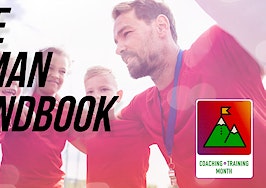 In today’s virtual, work-from-home environment, agents are seeking training and coaching in entirely new ways. In August, we’re laser-focused on what defines good coaching today and how to get the most out of it.
In today’s virtual, work-from-home environment, agents are seeking training and coaching in entirely new ways. In August, we’re laser-focused on what defines good coaching today and how to get the most out of it.
Coaching can change lives.
That, at least, has been the take away recently from a number of real estate professionals who spoke with Inman. In general, they described making more money after working with coaches, having better work-life balances and overall experiencing more satisfaction in their careers.
However, to get a sense of how widespread those sentiments are in the business, Inman recently published a survey with a series of questions related to coaching. The survey launched last week and ultimately garnered more than 250 responses.
The ultimate takeaway from the survey is that coaching is popular among Inman readers, who generally expressed confidence in the practice and an interest in using it in the future. It does, in other words, tend to work for people.
Probably the first specific thing that jumps out from the survey is how many people have already used a coach, with 76 percent saying they have done so in the past.

Credit: Inman
Similarly, 78 percent said they plan to use a coach in the future. These results aren’t scientific — the survey respondents were self-selecting of course — but they do at least indicate confidence in coaching as a concept.
That conclusion is further supported by responses to a question asking respondents when in their careers they thought coaching would be most beneficial. Ultimately, the overwhelming majority selected “any/all of the above” times in their careers.

Credit: Inman
The findings also echo comments industry leaders made to Inman suggesting coaching can be beneficial even for late-career executives.
The survey also shed light on what type of coaching is the most popular. For example, more than half of the respondents, or 52 percent, said they have worked with a coach for longer than a year, and two thirds said they signed ongoing contracts with their coaches.

Credit: Inman
Relatedly, nearly four fifths of the survey respondents, or 79 percent, revealed that their coaching experiences were done one-on-one, as opposed to in a group setting. Furthermore 84 percent of respondents said that in the future they would be more interested in one-on-one coaching verses a group experience.

Credit: Inman
Ongoing, one-on-one mentoring programs have historically been popular in real estate, but thanks to the proliferation of technology there are also many other options that now exist, such as video coaching and social media-based programs. However, these survey findings suggest that one of the more classic approaches to coaching still holds significant sway, and that real estate professionals still appreciate having lasting connections with individual people.
One of the more surprising results also had to do with how agents and brokers form those connections. Despite the proliferation of video conferencing apps, especially during the ongoing pandemic, 51 percent — a majority and an overwhelming plurality — of respondents said that they communicated with their coach via phone calls.
Video conferencing was a distant second, with just 27 percent.

Credit: Inman
Additionally, a plurality of respondents, or 36 percent, said they have communicated with their coaches once a week. The second most popular response to that question, with 29 percent, indicated communication happened several times a month.
These findings, too, indicate that relatively traditional coaching offerings have a strong grip on the industry.
The survey also sheds light on why coaching remains popular: It makes people more money. Indeed, a full 60 percent of respondents said that after working with a coach they earned more.

Credit: Inman
Results were more mixed when it came to other outcomes, with 45 percent saying coaching did not lead to things like non-monetary career opportunities such as promotions or jobs. However, 53 percent did say that coaching led to lifestyle improvements.
The number of respondents who haven’t used a coach before was relatively small, but among them the biggest obstacle appears to be cost, with 13 percent saying “coaching is too expensive.” Not finding the right person was the second most popular answer among those who haven’t used a coach, at 8 percent.
However, a full 63 percent of respondents said the question didn’t apply to them, presumably because they have used a coach.
Those findings suggest that, for a majority of people in real estate, obstacles to coaching are relatively minor.
On the topic of cost, the survey also found that a plurality of respondents would be willing to spend between $500 and $1,000 for a coach. Large percentages said they were willing to spend a little more or a little less than that, but perhaps the most surprising finding on prices was that 10 percent indicated a willingness to spend $10,000 or more.

Credit: Inman
Other significant findings from the survey include that 43 percent of respondents who identify as brokers or agents said they have also worked as coaches in the past, and that 31 percent of respondents said the coronavirus pandemic increased their interest in coaching.
There’s little doubt that coaching will continue to evolve in the future, especially given the rapid changes real estate has seen this year alone. But the survey findings suggest that the practice is here to stay. And indeed, when asked about satisfaction generally with coaching, more than 50 percent ranked their experiences either a 4 or 5 — the two highest marks possible.





